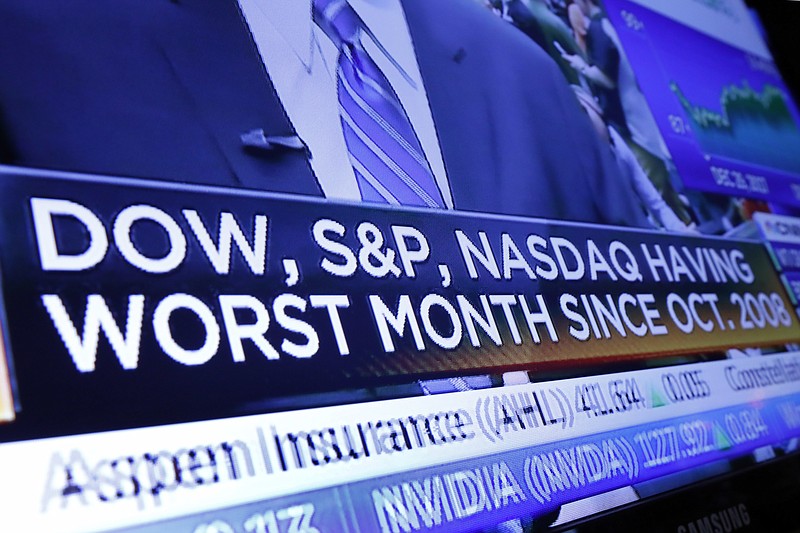Wall Street notched its best day in 10 years as stocks rallied back Wednesday, giving some post-Christmas hope to a market that has otherwise been battered this December.
The Dow Jones Industrial Average jumped more than 1,000 points - its biggest point-gain ever - rising nearly 5 percent as investors returned from a holiday break. The benchmark S&P 500 index also gained 5 percent and the technology heavy Nasdaq rose 5.8 percent.
But even with the rally, the market remains on track for its worst December since 1931, during the depths of the Great Depression, and to finish 2018 with its steepest losses in a decade.
Technology companies, health care stocks, banks drove much of the broad rally. Retailers also were big gainers, as traders cheered a healthy holiday shopping season marked by robust consumer spending. Amazon had its biggest gain in more than a year.
But what really might have pushed stocks over the top was a signal from Washington, D.C., that President Donald Trump would not try to oust the chairman of the Federal Reserve.
On Monday, Trump tweeted another critical volley about the central bank's policy, rattling markets over the possibility the White House might interfere with the traditionally independent Federal Reserve. But in an interview with the Wall Street Journal published Wednesday, a White House economic adviser said that Fed chairman Jerome Powell is in no danger of being fired.
Energy stocks also rebounded as the price of U.S. crude oil notched its biggest one-day gain in more than two years.
All told, the S&P 500 index rose 116.60 points, or 5 percent, to 2,467.70. The Dow soared 1,086.25 points, or 5 percent, to 22,878.45. The tech-heavy Nasdaq gained 361.44 points, or 5.8 percent, to 6,554.36. The Russell 2000 index of smaller-company stocks picked up 62.89 points, or 5 percent, 1,329.81.
Trading volume was lighter than usual following the Christmas holiday. Markets in Europe, Hong Kong and Australia were closed.
"The real question is do we have follow-through for the rest of this week," said Sam Stovall, chief investment strategist for CFRA.
Wednesday's gains pulled the S&P 500 back from the brink of what Wall Street calls a bear market - a 20 percent tumble from an index's peak. A further stumble would have marked the end to the longest bull market for stocks in modern history after nearly 10 years. The index is now down 15.8 percent since its all-time high Sept. 20.
Stocks fell sharply Monday after Trump lashed out at the central bank. Administration officials had spent the weekend trying to assure financial markets that Fed chairman Jerome Powell's job was safe. On Tuesday, Trump reiterated his view that the Federal Reserve is raising interest rates too fast, but called the independent agency's rate hikes a "form of safety" for an economy doing well.
On Wednesday, Kevin Hassett, chairman of the White House Council of Economic Advisers, weighed in, saying Powell is in no danger of being fired, the Wall Street Journal reported.
The lackluster finish to 2018 comes as most economists expect growth to slow in 2019, though not by enough to slide into a full-blown recession. Many economic barometers still look encouraging. Unemployment is at 3.7 percent, the lowest since 1969. Inflation is tame. Pay growth has picked up. Consumers boosted their spending this holiday season.
Even so, traders have been jittery this autumn over signs that the global economy is slowing, the escalating U.S. trade dispute with China and another interest rate increase by the Fed. Many investors are growing worried that corporate profits - which drive stock market gains - are poised to weaken.
Some of what Wall Street sees coming out of the White House has added to the market's uncertainty, specifically the president's attacks on the Fed and remarks about the ongoing trade conflict with China.
The president could help restore some stability to the market if he "gives his thumbs a vacation," Stovall said.
"Tweet things that are more constructive in terms of working out an agreement with Democrats and with China. And then just remain silent as it relates to the Fed," Stovall said.

